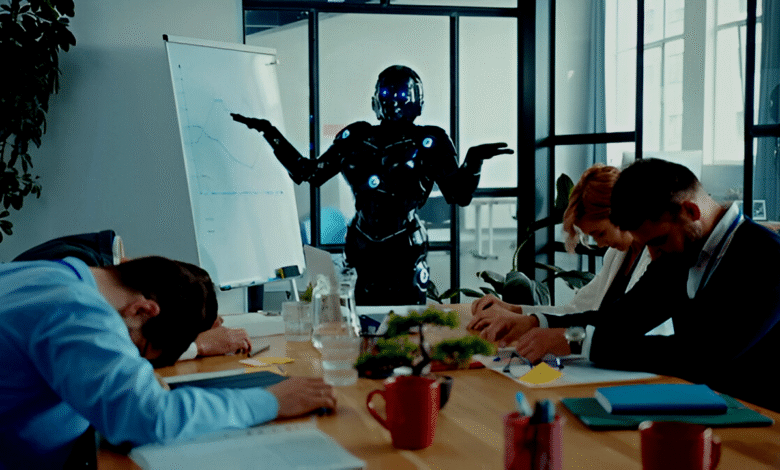Will Robots Take Over Your Job Here’s What Experts Say
Robots and AI are transforming jobs Experts reveal which careers are at risk and how to future-proof your skills in the automation age.

The rise of Robots Take Over and AI in the workplace has ignited heated debates about the future of employment. As automation becomes more sophisticated, many workers fear their jobs could be replaced by machines. However, experts suggest that while AI and robotics will transform certain industries, they are unlikely to eliminate human labor entirely. Instead, the job market is expected to evolve, with new roles emerging alongside technological Robots Take Over. Understanding which jobs are at risk and how to adapt will be crucial for professionals navigating this shift.
Historically, technological revolutions have disrupted industries but ultimately created more opportunities than they destroyed. The same may hold true for the current wave of automation and AI. While repetitive, manual, and data-driven tasks are most vulnerable, jobs requiring creativity, emotional intelligence, and complex problem-solving remain firmly in the human domain. By analyzing expert predictions and labor trends, we can better prepare for a future where robots and humans work side by side rather than one replacing the other.
Will Robots Take Over Your Job Here’s What Experts Say
Unprecedented Technological Acceleration
While automation has existed for decades in manufacturing and simple workflows, the convergence of AI, machine learning, and Robots Take Over has dramatically expanded its capabilities. Unlike earlier mechanical automation, today’s AI-powered systems can learn, adapt, and make decisions transforming industries from healthcare (diagnostic algorithms) to finance (automated trading). The McKinsey Global Institute report highlights that nearly 60% of occupations will see 30% of their tasks automated by 2030, signaling a shift toward hybrid workforces where humans and machines collaborate.
Efficiency vs. Job Transformation
Businesses adopt automation primarily to boost efficiency AI chatbots resolve customer queries instantly, while robotic process automation (RPA) eliminates human error in data Robots Take Over. However, experts argue that automation is less about job elimination and more about role redefinition. For instance, bank tellers now focus on complex customer needs while ATMs handle cash transactions. This evolution demands upskilling: workers must learn to manage, interpret, or innovate alongside AI tools to stay relevant in the changing economy.
Jobs Most at Risk of Automation
High-Risk Rule-Based and Repetitive Roles
Jobs centered on predictable, routine tasks face the greatest automation threat. Manufacturing assembly lines now use robotic arms with 99.9% precision, while AI data processors can analyze millions of records in minutes. The Oxford Economics study warns that 20 million factory jobs may vanish by 2030, with telemarketing seeing 85% automation potential as chatbots master natural language processing.
Unexpected Vulnerabilities in White-Collar Sectors
The wave of automation is now reaching higher-value professional roles, disrupting traditional assumptions about white-collar job Robots Take Over. AI accounting tools like QuickBooks AI now handle everything from expense categorization to financial forecasting with minimal human intervention, while legal research algorithms such as ROSS Intelligence can analyze thousands of case files in seconds work that would take paralegals weeks. In healthcare, diagnostic AI systems like IBM Watson Health demonstrate accuracy comparable to experienced radiologists in identifying tumors.
Automation-Resistant Career Safe Havens
While automation transforms the workforce, roles leveraging uniquely human skills remain resilient against technological Robots Take Over. Educators thrive where AI falls short in building emotional connections, adapting lessons to individual learning styles, and fostering universal basic income (UBI). Healthcare professionals combine medical expertise with empathy, making complex ethical decisions and providing compassionate care that algorithms cannot replicate. In creative fields, art directors and strategists bring original vision and cultural nuance that surpasses AI’s pattern-based generation.
How AI and Robots Will Create New Jobs
Emergence of New Tech-Driven Professions
The AI revolution is spawning entirely new career categories that didn’t exist a decade ago. Data scientists who interpret complex algorithms, machine learning engineers who build intelligent systems, and AI ethicists who ensure responsible development are now among the fastest-growing Robots Take Over. The World Economic Forum projects 97 million new roles will emerge by 2025 in fields like quantum computing, robotics engineering, and human-AI interaction design.
The Human Oversight Economy
As automation spreads, it generates demand for human oversight roles AI trainers who teach machine learning models. Robotics maintenance technicians servicing automated systems. Cybersecurity specialists protecting AI infrastructure. These positions demonstrate how automation doesn’t replace workers but rather reshapes job functions, enabling humans to focus on strategic oversight, creative problem-solving, and managing the human-AI interface tasks where human judgment remains Robots Take Over.
Preparing for the Future of Work
To stay relevant in an AI-driven economy, workers must embrace lifelong learning. Upskilling in digital literacy, coding, and AI management can provide a competitive edge. Online courses, certifications, and vocational training programs are excellent ways to adapt to the changing job market. Experts also recommend developing soft skills such as critical thinking, problem-solving, and emotional intelligence, as these are harder to automate. Networking and staying informed about industry trends can also help professionals anticipate shifts and position themselves for future Robots Take Over.
The Role of Governments and Businesses
Policy-Driven Workforce Preparation
Governments must lead structural reforms to future-proof the labor market through education system overhauls that emphasize STEM skills, digital literacy, and adaptability training. Forward-thinking policies like Singapore’s Skills Future initiative demonstrate how national programs can incentivize lifelong learning. Additionally, safety net proposals such as universal basic income (UBI) are gaining traction as potential buffers against short-term job Robots Take Over, with pilot programs in Finland and California showing promising social and economic outcomes.
Corporate Responsibility in Human-Centric Automation
Progressive corporations are setting benchmarks by investing heavily in employee reskilling ecosystems. Amazon’s $700 million upskilling pledge and Google’s Career Certificates program exemplify how businesses can transform automation challenges into talent opportunities. The most sustainable approaches foster public-private partnerships like Germany’s dual education system where governments, tech firms, and universities collaborate to align curricula with emerging AI-driven job Robots Take Over, ensuring smoother workforce transitions.
Read More: Are Foldable Phones Worth It in 2025? Honest Review
Conclusion
The question of whether robots will take over your job doesn’t have a simple yes-or-no answer. While automation and AI will undoubtedly replace certain repetitive and predictable roles, they are equally likely to create new opportunities that we can’t yet fully envision. Experts agree that the future workforce will involve collaboration between humans and Robots Take Over, with each playing to their unique strengths. Rather than fearing displacement, workers should focus on adapting their skills to thrive in this evolving landscape.
Ultimately, robots and AI are tools that can enhance productivity and innovation across industries. The key to job security lies in developing uniquely human capabilities like creativity, emotional intelligence, and strategic thinking – skills that machines cannot easily replicate. By embracing lifelong learning and staying attuned to technological advancements, professionals can position themselves not as victims of automation, but as essential participants in the future of work. The rise of Robots Take Over may change the nature of jobs, but it doesn’t have to mean the end of meaningful human employment.
FAQs
Which jobs are most likely to be replaced by robots?
Jobs involving repetitive tasks, such as manufacturing, data entry, and telemarketing, are at the highest risk of automation.
Will AI create more jobs than it eliminates?
Experts believe AI will create new roles in tech, AI maintenance, and data analysis, potentially offsetting job losses.
How can I future-proof my career against automation?
Develop skills in AI, programming, and emotional intelligence to stay competitive in an evolving job market.
What industries will benefit the most from AI?
Healthcare, education, and creative industries will see significant benefits from AI-powered tools.
Should governments regulate AI and automation?
Many experts advocate for policies that ensure ethical AI use and support workers displaced by automation.











